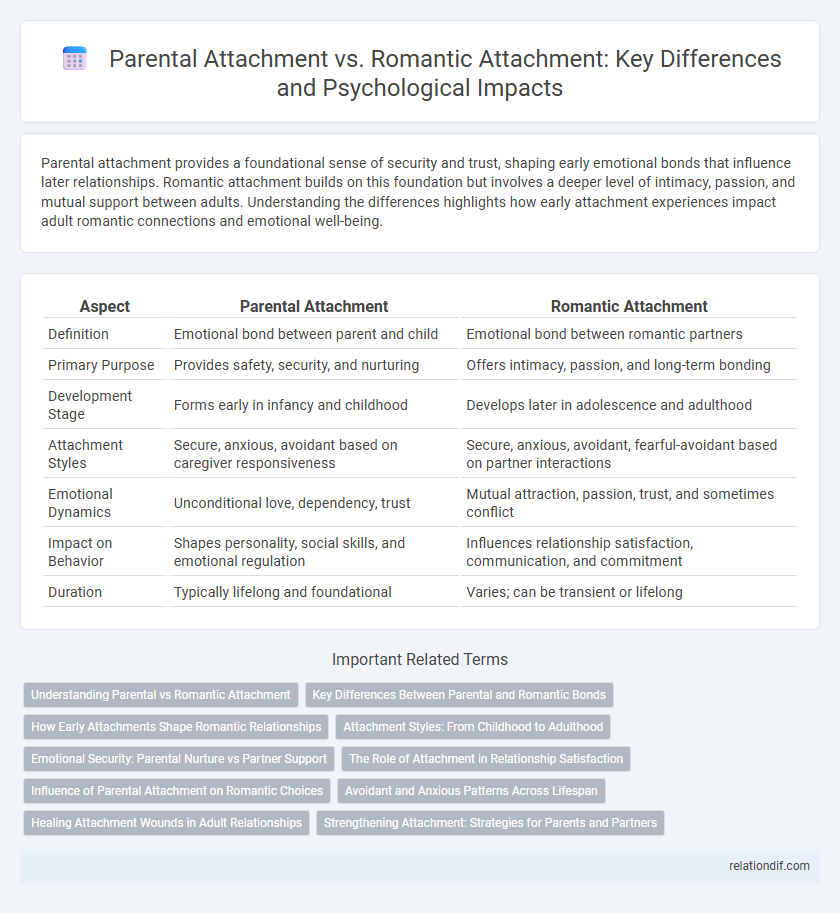Parental attachment provides a foundational sense of security and trust, shaping early emotional bonds that influence later relationships. Romantic attachment builds on this foundation but involves a deeper level of intimacy, passion, and mutual support between adults. Understanding the differences highlights how early attachment experiences impact adult romantic connections and emotional well-being.
Table of Comparison
| Aspect | Parental Attachment | Romantic Attachment |
|---|---|---|
| Definition | Emotional bond between parent and child | Emotional bond between romantic partners |
| Primary Purpose | Provides safety, security, and nurturing | Offers intimacy, passion, and long-term bonding |
| Development Stage | Forms early in infancy and childhood | Develops later in adolescence and adulthood |
| Attachment Styles | Secure, anxious, avoidant based on caregiver responsiveness | Secure, anxious, avoidant, fearful-avoidant based on partner interactions |
| Emotional Dynamics | Unconditional love, dependency, trust | Mutual attraction, passion, trust, and sometimes conflict |
| Impact on Behavior | Shapes personality, social skills, and emotional regulation | Influences relationship satisfaction, communication, and commitment |
| Duration | Typically lifelong and foundational | Varies; can be transient or lifelong |
Understanding Parental vs Romantic Attachment
Parental attachment involves the deep emotional bond and security formed between a child and caregiver, which shapes foundational trust and emotional regulation. Romantic attachment reflects the intimate and reciprocal connection between partners, influenced by early attachment patterns but also evolving through shared experiences and emotional needs. Understanding the distinctions in attachment styles helps clarify how individuals form and maintain relationships in different relational contexts.
Key Differences Between Parental and Romantic Bonds
Parental attachment is characterized by unconditional caregiving, safety, and long-term dependency, fostering emotional security during early development. Romantic attachment involves mutual attraction, intimacy, and passion, emphasizing reciprocal emotional needs and partnership. The key differences lie in the nature of dependency, emotional intimacy, and the developmental roles each bond fulfills in an individual's life.
How Early Attachments Shape Romantic Relationships
Early parental attachments play a crucial role in shaping individuals' expectations and behaviors in later romantic relationships. Secure attachments formed with caregivers foster trust, emotional regulation, and intimacy, which translate into healthier romantic connections. Conversely, insecure or avoidant parental bonds may contribute to challenges such as fear of closeness or dependency issues in adult romantic engagements.
Attachment Styles: From Childhood to Adulthood
Parental attachment shapes core attachment styles, influencing how individuals form romantic relationships in adulthood. Secure attachment in childhood typically leads to healthier, more trusting romantic connections, while insecure attachment styles such as anxious or avoidant often result in challenges with intimacy and emotional regulation. Research highlights that early caregiving experiences create neural and emotional frameworks, impacting attachment patterns that persist across the lifespan.
Emotional Security: Parental Nurture vs Partner Support
Parental attachment establishes a foundation of emotional security through consistent nurture, providing safety and stability essential for healthy development. Romantic attachment relies on partner support to maintain mutual trust and emotional intimacy, fostering resilience in adult relationships. Both forms of attachment contribute uniquely to emotional well-being by shaping trust, empathy, and self-regulation skills.
The Role of Attachment in Relationship Satisfaction
Parental attachment shapes early relational templates influencing emotional security and trust, which significantly affect romantic attachment styles in adulthood. Secure parental attachment correlates with higher relationship satisfaction through enhanced communication, empathy, and conflict resolution skills in romantic partnerships. In contrast, insecure parental attachment often leads to anxious or avoidant romantic attachments, reducing relationship satisfaction and stability.
Influence of Parental Attachment on Romantic Choices
Parental attachment significantly shapes an individual's romantic attachment style by establishing early patterns of trust, security, and emotional regulation. Secure parental attachment often leads to healthier romantic relationships characterized by stability and intimacy, while insecure parental attachment may contribute to challenges such as anxiety or avoidance in romantic choices. Studies indicate that the quality of early parental bonds directly influences partner selection, intimacy levels, and conflict resolution strategies in adult romantic relationships.
Avoidant and Anxious Patterns Across Lifespan
Avoidant and anxious attachment patterns manifest differently in parental and romantic relationships, influencing emotional regulation and intimacy across the lifespan. Avoidant attachment involves emotional distancing and self-reliance in both parenting and romantic contexts, often resulting in challenges with closeness and trust. Anxious attachment, characterized by insecurity and fear of abandonment, prompts heightened sensitivity to relational cues, impacting caregiving behaviors and romantic commitment stability.
Healing Attachment Wounds in Adult Relationships
Parental attachment forms the foundational blueprint for adult romantic attachment patterns, influencing trust, intimacy, and emotional regulation. Healing attachment wounds in adult relationships involves recognizing these early emotional imprints and fostering secure bonds through consistent communication, empathy, and vulnerability. Therapeutic approaches like Emotionally Focused Therapy (EFT) and mindfulness practices effectively address attachment insecurities, promoting resilience and deeper emotional connection.
Strengthening Attachment: Strategies for Parents and Partners
Parental attachment fosters security and trust during early development through consistent responsiveness and emotional availability, laying the foundation for healthy relationship patterns. Romantic attachment benefits from open communication, shared experiences, and emotional support to deepen intimacy and bond strength between partners. Both parents and partners can strengthen attachment by practicing empathy, validating emotions, and maintaining reliability in their interactions.
Parental attachment vs romantic attachment Infographic

 relationdif.com
relationdif.com